When it comes to thrillers, I’ve always found something particularly compelling about characters with alter egos. Nikki Griffin, the bookseller and PI who I introduced in my debut, Save Me from Dangerous Men, is a woman with a wildly different outer and inner existence. By day Nikki works at her Berkeley bookshop, where she delights in recommending the right book to the right person. But there are some problems in the world that even books cannot solve, and sometimes Nikki steps away from the shelves to dole out violent but proportionate vigilante justice on behalf of defenseless people who have been threatened or abused.
Sometimes what is most carefully submerged tends to surface uninvited; Nikki, whose family and childhood was destroyed by a brutal tragedy, struggles to restrain her violent tendencies even as she employs these skills to right wrongs. In the sequel, One Got Away, I continue to explore her fractures of personality while asking whether Nikki can ever lead a normal life—and does she even really want to? As one character observes to her, “Most people are far more afraid of what’s under the bed than of what they see in the mirror.” But I think many of the characters in the books listed below, Nikki included, might answer emphatically with the latter.
So, with an eye toward some of the great alter ego characters in thrillers, mysteries, and suspense, here are a few personal favorites of mine.
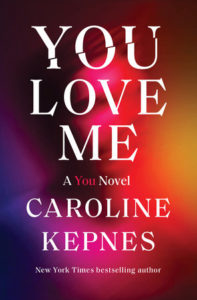
You Love Me, Caroline Kepnes
The world of thrillers is populated by some awfully bad people, but serial killer and stalker Joe Goldberg stands out as particularly unsettling… and I absolutely love it. In the third book in Caroline Kepnes’ You series, Joe is determined to turn over a new leaf—or page, rather, as he gets a job at a quiet little library in the Pacific Northwest and soon falls for his librarian colleague. There’s a problem, though, as she’s happily married. And a worse problem: underneath the bland façade, Goldberg is still very much Goldberg, albeit one who seems determined to rely more on psychological manipulation than physical violence. Kepnes has created a deliciously dark character and a fantastic series.
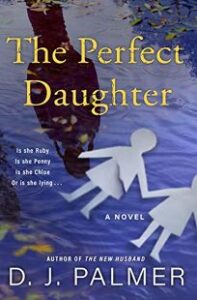
The Perfect Daughter, DJ Palmer
D.J. Palmer has proven himself to excel at ratcheting up the intensity while keeping us off-balance and guessing, and The Perfect Daughter is no exception as he takes on an ambitious array of subjects, from mental illness to familial ties to the criminal justice system itself. When 16-year-old Penny Francone is charged with murder, the facts seem undisputed and the case seems open and shut. But Penny, diagnosed with multiple personality disorder, is also Ruby… and Chloe… and Eve. Readers will find themselves caught up in a bewildering and delightful maze as Palmer slowly reveals the layers of this Russian doll of a book.
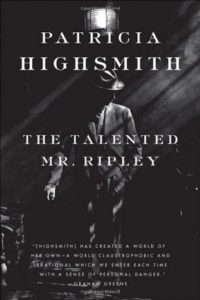
The Talented Mr. Ripley, Patricia Highsmith
It would be an egregious omission if I didn’t include one of the most iconic alter egos out there: Tom Ripley. In the first of the series, Patricia Highsmith introduces us to her con man and murderer extraordinaire. Charming but bland, attractive yet unassuming, likeable and forgettable—this is Ripley’s meticulously curated exterior. This mask hides a rather sociopathic personality with a hellbent willingness to opportunistically take what he wants, regardless of who he hurts (or worse) in the process. Fittingly, Ripley also shows himself to be a man of supreme ambivalence in all matters—sexually, morally, vocationally. Yet despite his many proven talents, we wonder whether his chameleon nature will catch up to him eventually.

The Shining, Stephen King
Although popularly thought of as pure horror, Stephen King’s masterpiece The Shining could equally be an intense psychological thriller as it traces Jack Torrance’s hibernal descent into homicidal and near-filicidal madness. For much of the book, Torrance inhabits two starkly different emotional realities. Outwardly, he’s a father, husband, and author, placidly trying to fulfill his professional duties as caretaker of the Overlock Hotel while finally writing the novel he’s desperate to complete. Inwardly, it’s a very different story, as he devolves into a seething, tortured wreck of a man, increasingly devoted only to the murderous hotel that he calls his residence. This being King, is it any surprise which side wins out in the end…?

Shutter Island, Dennis Lehane
In Dennis Lehane’s post-WWII-era sensation, U.S. Marshal Teddy Daniels investigates a patient’s disappearance at Ashecliffe Hospital, an infamous home for the criminally insane on the titular Shutter Island. Without giving away too much, suffice to say that Teddy Daniels occupies two very different existences, and each is governed by its own truth. As Teddy single-mindedly pursues his case and the shadowy patient he believes is behind his own wife’s death, we begin to wonder who exactly this U.S. Marshal is—and whether he will be able to escape not only the island he’s trapped on, but the ghosts within his own head.
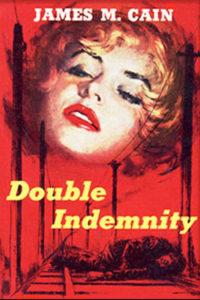
Double Indemnity, James N. Cain
When talking alter egos in thrillers, it’s impossible not to include at least one classic femme fatale. There are many excellent choices, but it’s hard to do better than Phyllis Nirdlinger, James N. Cain’s deadly creation (so memorably played by Barbara Stanwyck in the film adaptation). A beautiful, bored blond housewife looking for a bit of spousal life insurance and maybe a little fun along the way… what could go wrong? As Walter Huff, Cain’s patsy of an insurance salesman learns (the hard way), just about everything. For good reason, this slender volume is one of the defining classics of the genre.
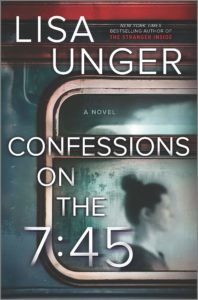
Confessions on the 7:45, Lisa Unger
With its deliberate invocation of Strangers on A Train, Lisa Unger pays homage to an iconic classic of the genre while carving her own contemporary and highly memorable path. The character of “Martha” is a wickedly perfect Trojan horse, delighting in turning people’s deepest desires against them for her own wishes. In one of my favorite scenes, we see her morph from naïve, starry-eyed employee with a crush on her married boss to an entirely uncontrollable and rather ruthless woman who has zero interest in anything but her own agenda—much less a married man’s libido. Unger is at the absolute top of her game in this book, and there are few writers who can equal her skill at pulling apart the threads of a domestic relationship to reveal the tattered house of cards standing in place of a real foundation.
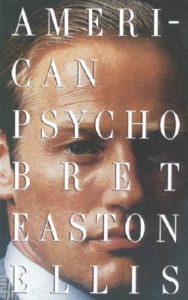
American Psycho, Bret Easton Ellis
Bret Easton Ellis’s most infamous creation, Patrick Bateman, is a character well-known enough to border on a symbol or synonym: excess, hedonism, the rampant ugliness of unfettered Wall Street avarice. Does Bateman imagine, or carry out, all of the bloodthirsty savagery that is described with such jarring detail? Opinions differ. Either way, what’s not in dispute is that there’s a real monster underneath those pinstriped Valentino power suits and thousand-watt grin, and for good reason this novel stands as a testament to the vacuous, ever-grasping nihilism of ‘80’s-era Manhattan greed.
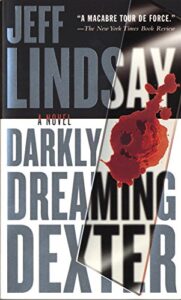
Darkly Dreaming Dexter, Jeff Lindsay
In terms of all-around body count, it’s hard to beat Jeff Lindsay’s Dexter Morgan. His nine-to-five is as a forensic blood spatter analysist for the Miami-Dade Police Department, and unsurprisingly he is very good at his job. He’s even better at his unpaid profession: a serial killer who tracks, captures, and kills murderers, rapists, and abductors who have evaded the legal system. Although governed by the strict code instilled by his father, Harry, Dexter and his Dark Passenger are one of the more savage examples of a hidden persona, and his affable mien is sometimes barely capable of hiding the viciousness flickering within.
***


















